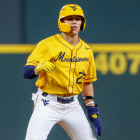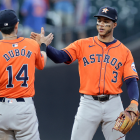The Cubs came into this season with at least 92 wins in each of the past four seasons, though the seasonal average was 97 wins. Three times they were in the NLCS and once in the World Series where they snapped a 108-year championship drought. Last season was a disappointment, though they won 95 regular-season games in a year that many things went very wrong. Opening day saw the Cubs win 12-4.
Since then, disaster.
The Cubs now head to Milwaukee to face the 6-1 Brewers with a 1-5 record -- stream select games regionally via fuboTV (Try for free). Yes, the team that entered the season with the expectation to take at least the division already faces a 4 1/2-game deficit one week in.
It's a disastrous start and it could get much worse.
Let's say the Cubs get swept by the Brewers. It's easy to sit here and lecture knee-jerkers about how long the season is and to let it breathe. Generally speaking, those are things that need to be said and are true. The knee-jerk reaction in a sport where teams play 162 games is worthless. I keep saying so myself. It's just that if the Cubs get swept in Milwaukee, they would be 1-8 while the Brewers were 9-1. That's a 7 1/2 game deficit to a good team. Even those who picked the Cubs to win the Central (*raises hand*) didn't think they'd beat them by more than seven games. Digging that deep a hole at any point in the season is trouble.
On the flip-side, the Cubs could sweep the Brewers and go home with a 4-5 road trip, which isn't actually a disaster. That would make the Brewers 6-4 while the best the Cardinals could be is 6-3. All of a sudden, everything is fine and we can get back to telling all the fans that overreact to single games or small samples -- as if it were football -- they should've settled down all along.
How do the Cubs get there? It's really simple, actually, though it might not be so simple for the actual personnel: Pitch better.
Point blank, the Cubs should be 4-2 right now.
Loss 1 on March 30 vs. Rangers: They had a 6-3 lead heading to the seventh inning and it was 6-5 heading to the eighth. Carl Edwards had a complete meltdown, giving up three runs on two walks and a home run without recording an out.
Loss 2 on March 31 vs. Rangers: They led 4-0 through four, 8-5 in the middle of the sixth, 8-6 through six and were tied, 10-10, heading to the ninth. Cole Hamels got squeezed a bit leading to a grand slam before meltdowns from Tyler Chatwood and Mike Montgomery.
Loss 4 on April 3 vs. Braves: With a 4-2 lead heading to the eighth, it looked in hand. The normally-reliable Steve Cishek walked all three batters he faced. Cubs manager Joe Maddon elected to replace him with Randy Rosario, who promptly gave up a bases-clearing double on his second pitch.
I'm making excuses, right? Nope. The Cubs lost those games fair and square thanks to their own futility on the mound. As I said above, they have to pitch better. Offensively, they lead the NL in average and on-base percentage -- even after seeing a perfect game by Braves starter Max Fried taken into the sixth inning on Thursday -- while ranking fourth in slugging. The starting pitching has been bad overall, but actually good enough to be 4-2.
Right now, it's on the bullpen. It was a concern coming into the season and it's far more than that right now. In 21 1/3 relief innings, the Cubs bullpen has an 8.86 ERA, 2.16 WHIP, an 0-3 record and three blown saves. Edwards has only gotten three outs but has allowed five walks and five earned runs. Brad Brach has walked five in 2 2/3 innings. Montgomery has given up eight hits, six earned runs and two homers in 2 2/3 innings. Chatwood has a 9.82 ERA and only three guys in the bullpen are better (and that includes Brach and Rosario).
The only pitcher in the bullpen the Cubs could be happy with right now is Brandon Kintzler. He's faced seven hitters and gotten eight outs (double play), striking out four. He's it. Everyone else has either been terrible or mediocre.
Cubs brass continues to say improvement has to come from within, the latest being general manager Jed Hoyer on Chicago radio on Thursday. As such, it's pretty simple. The starters need to be better, yes, but unless the likes of Edwards, Brach, Cishek and Montgomery step up, it's going to be a long season with a team that has grown accustomed to winning.
The culture has changed in Wrigleyville. Years ago, it would've been ridiculous to imagine a 95-win season being a disappointment, but that's how the Theo Epstein regime has raised the bar. If things continue on this path with the pitching, the bar gets lowered back to where it was with the only difference being that there isn't a fake goat curse to blame.


















